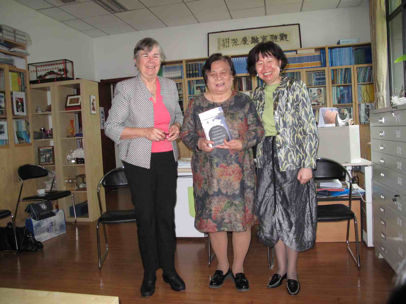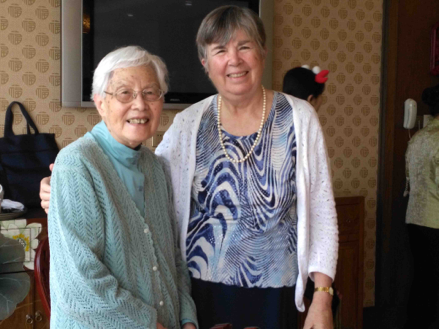By Ruth Hayhoe and Julia Pan
We were pleased to complete a major SSHRCC supported research project last autumn with the publication and promotion of Canadian Universities in China’s Transformation: An Untold Story by McGill Queens University Press. A main focus of our visit to China this spring was to present copies of the book to two outstanding women educators, one in the College of Geological and Ocean Sciences at Nanjing University, a leading comprehensive university and the other in Nanjing Normal University’s School of Education. Both have played crucial roles in educational and research collaboration between Canada and China over a thirty five year period and remain active into their eighties.
Academician Wang Ying has been a leading figure in collaborative research into environmental topics with the Universities of Waterloo, Dalhousie and Guelph, through support first from the IDRC (1988-92), then CIDA (1997-2007). She is world famous for her research into oceanography and marine geology.
In her collaborative work with the University of Waterloo she got to know its President, David Johnston, very well and later welcomed him to Nanjing University as Canada’s Governor General. It was such a pleasure to visit her in her office and present a copy of our new book, which has two chapters profiling the important research whereby Canadian and Chinese universities contributed to environmental sustainability in both China and Canada over the past two decades.

The other outstanding woman educator, Professor Lu Jie, is a leading scholar at Nanjing Normal University and was the first woman in China to be appointed a doctoral supervisor for the field of education in the early years after the Cultural Revolution ended. She was a key partner in our six year joint doctoral program which brought 22 doctoral students and visiting scholars to OISE, while 11 OISE doctoral students studied in China between 1989 and 1995.
One of the core areas of collaborative research that followed from 1995 to 2001 was moral education, an important area of concern for China as it moved from a planned economy to a socialist market economy. This move resulted in a remarkable economic transformation yet also brought serious crises of social disintegration and environmenal pollution in its train. Nanjing Normal now has a nationally prominent centre for Moral Education Research and the returnees from our joint project long ago hold leading positions in educational and governmental institutions all over China.

As China now takes up the role of a major provider of educational aid to countries in Africa and Southeast Asia, it will be interesting to see how far the model of partnership between Canadian and Chinese universities over a twenty five year period will have an influence on initiatives such as the set of 20-20 partnerships recently established between Chinese and African universities and the other forms of educational aid China is providing.
In lectures and seminars at universities in Hong Kong, Macau, Nanjing, Shanghai, Lanzhou and Tianjin, we explored the question of the future of China’s global educational influence and whether China’s civilizational tradition might be capable of nurturing an approach to educational aid that emphasizes dialogue, mutual benefit and the preservation of diversity, rather than repeating the somewhat patronising and often overly directive character of educational aid from both the so-called “advanced capitalist world” and the Soviet Union during the Cold War.
